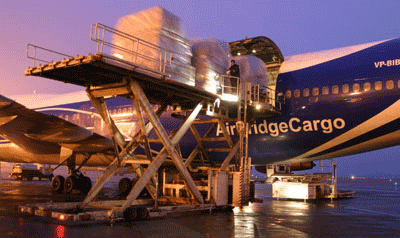At Munich Airbridge
Delivers The Goods
 Before
many of the usual suspects on the world cargo scene kicked off their series
of company statements masquerading as “discussion panels”
as part of Transport Logistic ’07, Day One was a humdinger with
a series of country presentations including The Baltic States, India,
Romania and Russia. Before
many of the usual suspects on the world cargo scene kicked off their series
of company statements masquerading as “discussion panels”
as part of Transport Logistic ’07, Day One was a humdinger with
a series of country presentations including The Baltic States, India,
Romania and Russia.
Each country sent in their experts to discuss
various reasons why the world should beat a path to their respective doors.
All were afforded two hours to parade a
cadre of transportation experts in front of conferees to tell a story.
After a while the non-stop pitch for business
became a bit of a blur, best received by the truly baptized in the respective
countries or by executives eager to specifically attend a destination
of interest.
That is exactly what happened at the Logistics
India presentation and also Globalization of the Russian Transport Market.
Curiously or maybe on purpose there were
not direct air cargo industry types on the menu Tuesday, as country after
country rolled out their logistics programs, with one exception.
Operating outside the Air Cargo Europe format
to come Wednesday, as part of the “Russian Day” presentation
Stan Wraight, President of Air Bridge Cargo blew the doors off the place
by delivering a smart, frank and forward looking touch of reality speech
at 1700h as the last presentation of the day.
Talk about saving the best for last.
 Stan
Wraight for as long as we can remember has been the consummate air cargo
professional. Stan
Wraight for as long as we can remember has been the consummate air cargo
professional.
From his days as part of Jacques Ancher’s
team at KLM Cargo, to his work at Mike Chowdry’s Atlas Air and now
as top executive at Air Bridge Cargo the company set to take delivery
of the advanced Boeing B747 freighters, Mr. Wraight was on message, just
in time and a welcome voice at Munich Russia Day June 12, 2007 as Transport
Logistic opened for business.
“A recent survey by Deloitte, a well
respected research organization, found that Russia like other countries
with rapidly growing economies, is hampered by poor logistics, and the
sheer size of the territory makes this particularly acute.
“So this creates unique challenges
for a start up Russian scheduled airline, and unique opportunities as
well.
“The Russian government has been clear
and very transparent in its objective to have Russia join the WTO, and
also to build on the existing infrastructure and create a new and dramatically
improved air transportation infrastructure for the Russian Federation.
“It also understands that to do so
changes must be made, and changes will be made.
“The first positive steps came about
in the past year with a commitment for a massive investment to improve
the country’s airport infrastructure and hubs.
“This was followed up with initiatives
to establish duty free zones and customs procedures which will assist
all airlines, but especially Russian airlines, to grow and be in a competitive
position in the years ahead.
“This is a good first step, but other
changes are also needed to make Russian airlines competitive and here
I refer to outdated rules from the central bank, import duties on aircraft,
VAT and electronic commerce among others. “These rules and regulations
do not hamper our foreign competitors, and this must be taken into account
before Russia really opens its skies to foreign airlines.
“But something else is being done
which will be of great significance for Russian all cargo airlines, and
that is greater control on “Grey Cargo”, that for the most
part moves through Scandinavian Airports but also via several EEC Gateways
as well.
“A recent report by the Bank of Finland’s
Institute for Economies in Transition, confirmed results of an inspection
by the customs services of Russia and Finland, that the discrepancy in
trade statistics caused by “double invoicing” is over one
third of the total.
“This practice has but one purpose,
to avoid the Russian tax system.
“Over 25% of all imported goods entered
Russia via Finland in 2005, so it is a significant issue according to
this report and totally distorts the real reason air cargo moves via that
gateway.
“According to an article published
in RBK Daily, the Russian government is involved in a “war”
against this practice, and is making great progress.
“The first target was very publicly
the mobile phone market, and the result today is that over 90% of this
traffic is now “white”.
“The phone companies took control,
did not want their reputations to suffer as a consequence of third parties,
and moved to all white clearance.
“They have not suffered at all in their
sales; Russia is the third largest market in the world for this commodity.
“The consequence of this was also a diversion
of this traffic from road to air, and the resulting efficiencies this
mode of transport offers to electronics companies became apparent.
“It was welcome news for ABC and our competitors
as well.
“Other actions by the Russian Federation
also sent a signal, that changes will come faster than many thought.
“The Russian State Parliament is planning
to discuss a draft on amendments to the Russian Customs Code, where Customs
Brokers and Importers will share responsibility for violations in declarations.
“This is a clear signal.
“In another initiative, on March 26th the
Russian and Chinese Customs officials signed a protocol on information
exchange in the presence of President Putin and Chairman Hu.
“This agreement “will shorten customs
procedures at crossing points and reduce costs for law abiding trade participants.
“It was also agreed that the information
standard used will be benchmarking a data model recommended by the standards
of the WTO.
“Everything I have mentioned is just a small
part of what is happening, but they are important steps for direct air
cargo development in Russia.
“As the attractiveness of schemes where
the only game is customs duty avoidance are eliminated, the world of logistics
and the fantastic opportunities brought to Russian importers will become
increasing apparent and important.
“Direct all cargo air services offered by
ABC and others will cut days off the transit times for clients, and through
a system of hubs in Russia open up direct air capabilities to these same
importers no matter where they are located.
“I can assure you, and this is through analysis
with numerous importers we work with, it’s not just a time saving
exercise.
“Direct air is in most cases less expensive
in total transportation costs than what is happening today which usually
involves a stop in Moscow.
Krasnoyarsk, St. Petersburg, Khabarovsk, both
Moscow airports of Shermemetyevo 1 and 2, plus Moscow’s Domodedevo
are served by direct 747 all cargo services by ABC, and we are just beginning.
“Through a domestic service using Russian
built palletized aircraft, we will continue to open up Russian cities
to the advantages of direct air logistics.
We invite our clients, logistics companies, freight
forwarders and government officials to join us in creating this network,
one that will truly benefit the Russian Federations economy and global
competitiveness.”
Geoffrey
|



